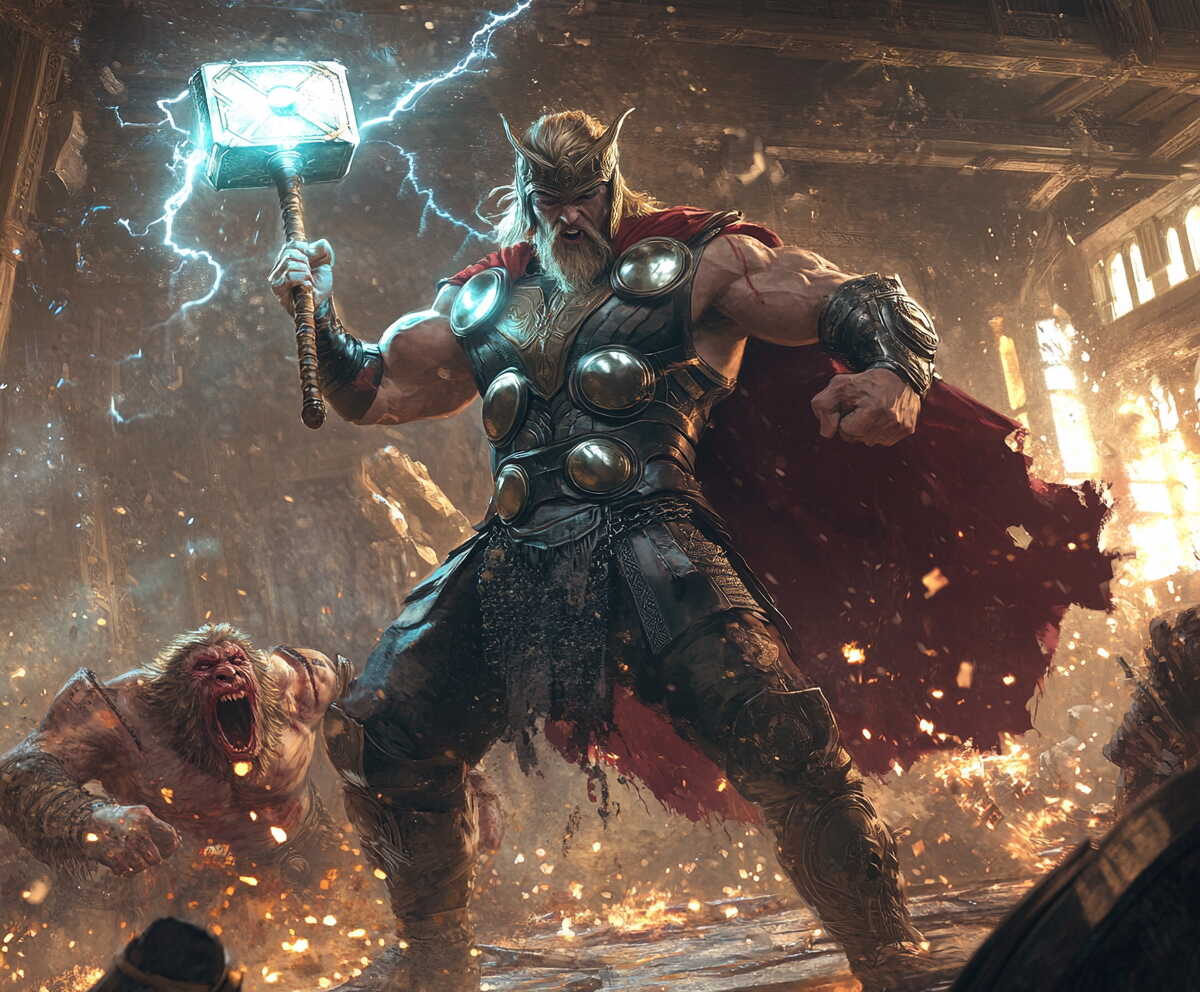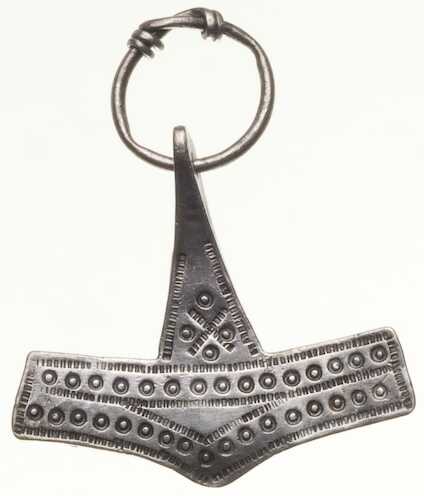
Thor
Introduction
Thor, a prominent figure in Norse mythology, is the god of thunder, lightning, and storms, revered for his immense strength and bravery. Son of Odin, the All-Father, and the earth goddess Jord, Thor wields the mighty hammer Mjölnir (MYOL-neer), which he uses to protect Asgard, the realm of the gods, and Midgard, the world of humans, from threats like giants and other malevolent forces. Known for his unrelenting courage, Thor is often depicted as a fierce warrior with a hearty appetite for battle, mead, and feasting. Despite his brash nature, he embodies loyalty and honor, making him a beloved deity among the Norse people. His tales, preserved in texts like the Poetic Edda and Prose Edda, highlight his role as a defender against chaos in the cosmos.
Thor's popularity in Germanic culture, both ancient and modern, underscores his enduring appeal as a symbol of protection and power. Historically, he was one of the most widely worshipped gods among the Norse and broader Germanic peoples, particularly by warriors and common folk who sought his favor in battle and daily life. Evidence of his widespread veneration is seen in the numerous Thor’s hammer amulets, known as Mjölnir pendants, discovered across Scandinavia and other Germanic regions, dating back over a thousand years. These artifacts, often worn as necklaces, have been unearthed in graves, settlements, and hoards, indicating that devotion to Thor persisted even as Christianity spread, with some amulets found as late as the 10th and 11th centuries. This archaeological record affirms Thor’s deep cultural resonance, a legacy that continues to captivate modern imaginations through literature, media, and revived pagan traditions.

Worship Through Jewelry
The nearby photo has been taken from the National Museum of Denmark. It depicts a silver pendant discovered near Rømersdal, Denmark; A small Thor's Hammer typical of Viking-era religious amulets. The amulet dates to the Iron Age (500 BC-1050 AD). The original image has been rotated and downsized. License: CC-BY-SA
Of note: two runes appear to be engraved on the amulet—gebō and thurisaz (ᚷ, ᚦ). These may serve as evidence that runes were more than mere letters; they also represented gods, cultural norms, and beliefs.
A Well-Rounded Warrior
Beyond his brute power, Thor’s tales often reveal a blend of wit, loyalty, and even vulnerability, painting a complex portrait of a deity both fearsome and relatable. His adventures, preserved in the oral traditions and later written in the Poetic Edda, showcase not just his battles but also his interactions with gods, giants, and mortals alike.
One of the most celebrated stories featuring Thor is Þrymskviða (Old Norse, pronounced THRUM-skvith-uh), or "The Lay of Thrym," a poem from the Poetic Edda that stands as a cornerstone in understanding his character. This lively and humorous tale, among the most popular attestations of Thor’s exploits, pits him against the giant Thrym in a quest to reclaim his stolen hammer, Mjölnir. Rich with clever disguises, unexpected twists, and Thor’s signature blend of brawn and determination, The Lay of Thrym offers a vivid entry point into the thunder god’s world, making it an ideal starting place for exploring his enduring legacy in Norse lore.
Þrymskviða

The photo above is of folio (page) 17r within a Danish replica of the Codex Regius (Latin, Royal Codex/Manuscript), a 13th-century Icelandic manuscript that preserves the Poetic Edda. The Codex Regius is one of the most important surviving sources for understanding pre-Christian Scandinavian culture and literature. The replica was published in 1891 by Finnur Jónsson and Ludvig F. A. Wimmer.
The first line of The Lay of Thrym starts with a big "R" on the left side. The opening line reads, "Reiður var þá Vingþór," which translates to "Vingthor (Thor) was angry then." You'll notice some shortcuts in the Codex, like a "v" with a line over it (called a macron) standing for the Old Norse word "var." "Vingthor" is a name that refers to Thor, meaning Battle-Thor, or, Swing-Thor. Names in Old Norse like Vingþór are often written without spaces between compound elements, reflecting a language where compounding was common and intuitive.
The entire manuscript is hosted on handrit.is, a digital library operated by the National and University Library of Iceland.
The Lay of Thrym
The following is a translation of the Þrymskviða poem from the Poetic Edda. The 1936 translation by Henry Adams Bellows was used as a base. The English has been modernized.
Thor was furious when he woke up
And found his mighty hammer gone;
He shook his beard, his hair stood on end,
As he searched all around.
These were the first words he spoke:
"Listen, Loki, hear me out,
No one on earth or up in the sky
Knows this: our hammer’s been stolen."
They went to Freyja’s fine house,
And these were the first words he spoke:
"Freyja, will you lend me your feather-dress
So I can go look for my hammer?"
Freyja said:
"I’d give it to you if it were silver,
I’d hand it over even if it were gold."
Then Loki flew off, the feather-dress humming,
Leaving the gods’ home behind,
Until he reached the giants’ land.
Thrym sat on a hill, the giants’ boss,
Tying gold leashes on his dogs,
Brushing the manes of his horses.
Thrym said:
"How are the gods? How are the elves?
Why’d you come alone to giant country?"
Loki said:
"The gods are in trouble, the elves are too!
Did you hide Thor’s hammer?"
Thrym said:
"Yeah, I hid Thor’s hammer,
Eight miles deep in the ground;
No one’s getting it back
Unless I get Freyja as my wife."
Then Loki flew off, the feather-dress humming,
Leaving the giants’ home behind,
Until he reached the gods’ realm.
He met Thor in the courtyard,
And these were the first words he spoke:
"Got any news, or just problems?
Spill it now while you’re still standing;
Sit too long and you forget,
Lie down and you start making stuff up."
Loki said:
"I’ve got trouble and news:
Thrym, the giant king, has your hammer,
And no one’s getting it back
Unless he gets Freyja as his wife."
They went to find fair Freyja,
And these were the first words he spoke:
"Freyja, put on a bridal veil,
We’ve got to head to the giants’ place."
Freyja got mad, she snorted hard,
The gods’ huge hall shook,
Her awesome necklace snapped apart:
"I’d look like a total slut
If I went with you to the giants’ place."
The gods got together,
The goddesses too, holding a meeting,
The famous ones hatched a plan
To get Thor’s hammer back.
Heimdall spoke up, the palest god,
He knew the future like the Wanes:
"Let’s put a bridal veil on Thor,
Have him wear that big necklace;
"Let keys jingle around him,
A dress hanging down to his knees;
Stick some gems across his chest,
And a cute cap on his head."
Mighty Thor shot back:
"The gods would call me a wimp
If I let you put a veil on me."
Loki said:
"Shut up, Thor, don’t talk like that;
The giants will take over Asgard
If you don’t get your hammer back."
So they put the bridal veil on Thor,
And that big necklace too.
Keys jingled around him,
A dress hung down to his knees;
Gems sparkled across his chest,
And a cute cap sat on his head.
Loki said:
"I’ll go with you as your maid;
We’ll head to the giants’ place together."
The goats were brought back to the hall,
Pulling hard, ready to run;
Mountains cracked, the earth caught fire,
As Thor headed to giant land.
Thrym, the giants’ leader, shouted:
"Get up, giants, set the benches;
They’re bringing Freyja to be my bride,
Njorth’s daughter from Noatun.
"Gold-horned cows are in my stables,
Black oxen, a giant’s dream;
I’ve got tons of gems and jewels,
All I was missing was Freyja."
Evening came quick,
Beer was hauled out for the giants;
Thor ate an ox and eight salmon,
All the snacks meant for the ladies,
And chugged three barrels of mead.
Thrym, the giants’ leader, said:
"Who’s seen a bride eat like that?
Never saw one bite so big,
Or a girl drink more mead!"
The smart maid sitting nearby
Had an answer for the giant:
"Freyja hasn’t eaten for eight nights,
She was so pumped to get to giant land."
Thrym peeked under the veil, wanting a kiss,
Then jumped back across the hall:
"Why are Freyja’s eyes so scary?
They’re burning like fire!"
The smart maid sitting nearby
Had an answer for the giant:
"Freyja hasn’t slept for eight nights,
She was so pumped to get to giant land."
The giant’s unlucky sister showed up,
Not shy about asking for gifts:
"Hand over those red gold rings
If you want my love and a warm welcome."
Thrym, the giants’ leader, shouted:
"Bring the hammer to bless the bride;
Set Mjollnir on her knees,
Let Vor bind us together."
Thor’s heart laughed in his chest
When he saw his hammer again;
He smashed Thrym, the giant king, first,
Then took out all the giants.
He killed the giant’s old sister too,
The one who’d asked for gifts;
She got a hit instead of cash,
And a hammer blow instead of rings.
And that’s how Thor got his hammer back.